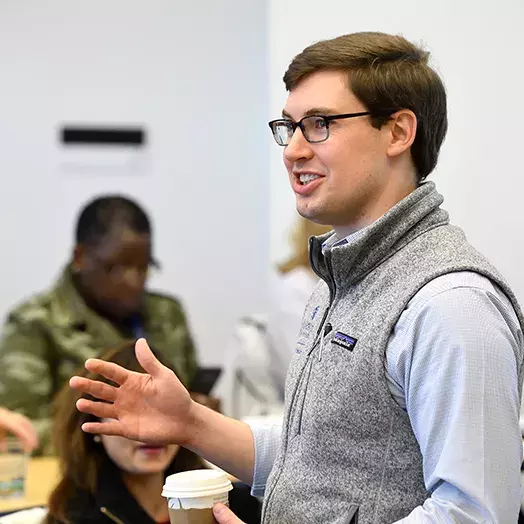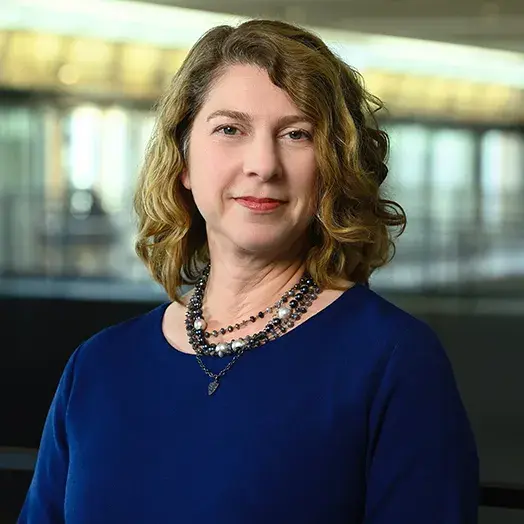
Seeing Others’ Big Triumphs, We May Feel More Motivated than Usual to Succeed
Article Highlights
- Not just triumphs, but also others’ failures, can increase our drive to do well.
- Paper recently published in Academy of Management Discoveries.
- Managers advised to inspire staffs by sharing workers’ success stories.
Observing the success of a colleague can motivate us to learn more and perform at a higher level.
But when we perceive that a peer’s accomplishment has risen above the usual standard of “good work” and can be rated an “exceptional” success, our motivation to learn is even greater, states a new paper co-authored by Johns Hopkins Carey Business School Assistant Professor Christopher Myers.
The motivation to learn is enhanced also when a colleague’s performance is perceived as a failure, according to the paper, “How Did You Do That? Exploring the Motivation to Learn from Others’ Exceptional Success,” recently published in Academy of Management Discoveries.
In the following Q&A, Myers, an expert in organizational behavior and the academic director of Carey’s Executive Education program, discusses some of the findings from the study and related topics, such as how this example of “vicarious learning” might be affected by the work-from-home conditions that many are experiencing during the COVID-19 pandemic.
QUESTION: The paper states that an individual’s motivation to learn was higher when they perceived performance by another person to be “more exceptionally successful, as compared to perceiving the other’s performance as a more ‘normal’ success.” In this context, what would typify an “exceptional” success, compared to a “normal” one?
CHRISTOPHER MYERS: One way we have thought about normal vs. exceptional success is whether the success could be categorized as “business as usual” – if we did what we usually do and got the (good) result we usually get, that would be a “normal” success. An exceptional success is one that is a bit unexpected or unusual, but in a good way: It went far better than we expected or planned.
In this way, an exceptional success is like the positive version of a failure - in most workplaces, we don’t expect to fail when we take on a task, so if we do, it is unusual and unexpected (and therefore might motivate us to learn and improve). When things go as we expect, we aren’t as motivated to learn, because we think we understand what happened and have things under control. But it’s also possible for things to go unexpectedly well, and that can be a source of learning, too (like a failure).
Did you and your co-authors determine whether one’s motivation to succeed, in the wake of someone else’s exceptional success, was rooted more in positive or negative emotions? For example: “I’m so happy for good old Joe’s huge success, and now I’m going to work harder so I can join him as an office leader” vs. “I’m so envious of that jerk Joe, and now I’m going to work harder so I can top him.”
Though we didn’t directly test the role of positive vs. negative emotions, we have some exploratory analyses showing that the effects of others’ performance on our motivation to learn are carried through feelings of interest – when others’ performance piques our interest or curiosity (which perhaps aligns more with the positive explanation).
There is past research suggesting that we sometimes like to attribute others’ good performance to “luck” or other external causes (“Well, Joe did well because he just got lucky”), but what we found interesting in our results was that people can also find others’ exceptional successes to be interesting, sparking their curiosity and desire to learn.
You also found some evidence that the motivation to learn is also higher when individuals perceive another’s performance as a failure. In those cases, what is making people feel more motivated?
This phenomenon has been observed in prior research as well – others’ failures serve as a vicarious “check” on our understanding in some way. We see that someone else (for instance, a peer) tried and failed, and so we are motivated to learn in order to avoid repeating their same mistake. We assume they did something wrong or lacked a key piece of knowledge, and so we try to correct that deficiency in ourselves to avoid failing in a similar situation.
Is the motivation to learn from others’ successes and failures what you mean by “the curvilinear effect”? Can you amplify on that?
We highlight the curvilinear nature of the motivation to learn from others’ performance because previously research has treated it as more linear or binary. That is, research had previously assumed we are motivated to learn from others’ failures, but not others’ success (for the attributional reasons highlighted above – their failure indicates a lack of knowledge or skill, or a bad behavior we might try to avoid, while their success might just be good luck).
What we show is that this motivation isn’t linear. As others’ performance continues increasing beyond “normal” success and into what we consider “exceptional” success, the motivation to learn doesn’t keep going down, it actually curves back up.
What to Read Next

research
Even Amid Social Distancing, ‘Vicarious Learning’ Can WorkSince the start of the pandemic, we’ve seen countless commentaries on how work life may be drastically changed – i.e., less time in a traditional office setting, more time working at home, more meetings and events held via Zoom, and so on. How might these changes in the ways people work affect the ways people are influenced by their colleagues’ successes and failures?
One of the major challenges of moving to a fully remote work environment is the reduced opportunity to encounter others’ performance “organically” in our work setting - for instance, bumping into someone in the halls and hearing about their latest project or getting word of someone’s exceptional success through office chatter.
This has posed a broader challenge for vicarious learning during the pandemic, as I have written about in other work, but it also inhibits our ability to learn about others’ exceptional successes in ways that might motivate our learning.
How might your findings prove useful to organization managers?
In many organizations, systems are already in place to process and learn from failures. In health care, for instance, teams spend considerable time and effort to get to the root of an accident or failed treatment so as not to repeat the same mistake in the future.
However, often times we spend less effort sharing or digging into our exceptional successes. Perhaps that’s because we view any success (normal or exceptional) as our intended outcome, so we assume there is nothing to learn from it (“We got it right, so we must already know what we are doing!”), or perhaps because people are wary of being seen “bragging” about their exceptional success.
Managers can work to encourage the sharing of these exceptional success stories so that others may learn. Though focusing on failure is certainly worthwhile, ignoring exceptional success leaves a lot of learning value undiscovered. Since both of these sorts of performance can motivate learning – but exceptional success doesn’t come with all the other negative implications of failure – focusing on these highly successful efforts can be a positive way of increasing peer learning in organizations.
About Our Experts

Christopher Myers, PhD (Management and Organizations, University of Michigan) is an assistant professor and academic director of Executive Education at the Johns Hopkins Carey Business School, with joint faculty appointments in the School of Medicine and Armstrong Institute for Patient Safety & Quality. His research explores questions of learning, development, and innovation in organizations, as well as how people learn vicariously from others’ knowledge and experience at work, and he focuses in particular on learning in health care organizations and other knowledge-intensive industries.


